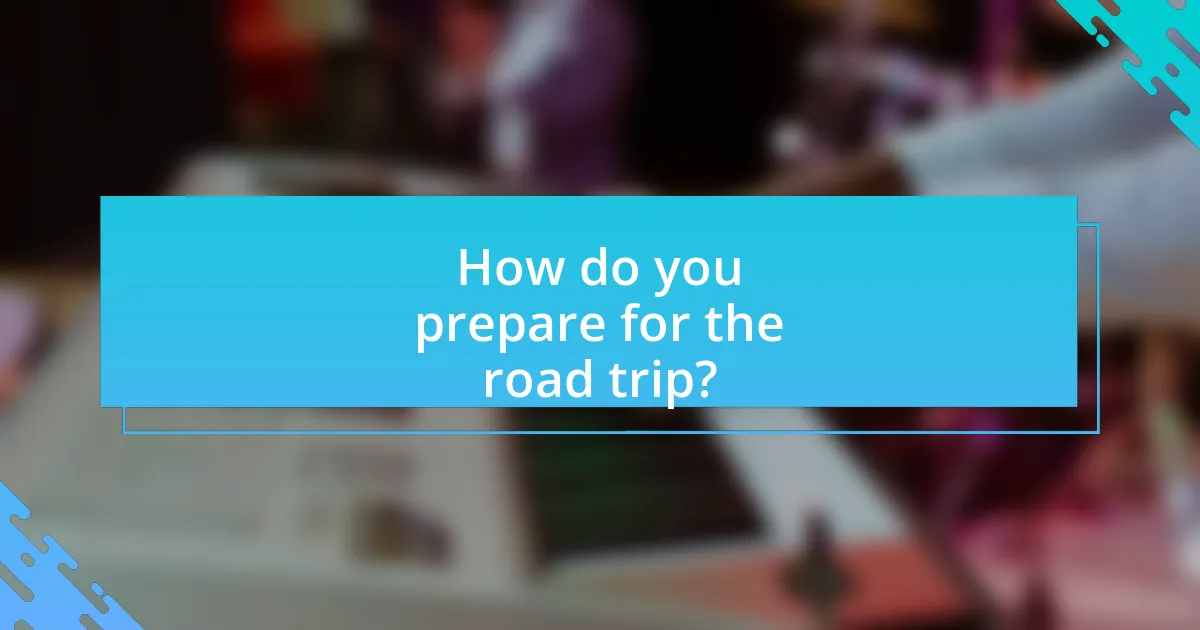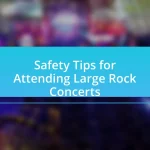The article focuses on planning the ultimate road trip to follow a band’s tour, detailing the sequential itinerary from the first concert to the last. It emphasizes the importance of route planning, budgeting for expenses, and preparing the vehicle to ensure a smooth journey. Key components include selecting memorable destinations, engaging with fellow fans, and enhancing the concert experience through effective strategies. Additionally, the article addresses safety tips, common challenges, and best practices for maintaining a positive mindset throughout the trip, providing a comprehensive guide for fans eager to immerse themselves in the live music experience.
What is the Ultimate Road Trip to Follow [Band Name]’s Tour?
The ultimate road trip to follow a band’s tour involves visiting each concert location in sequential order, starting from the first show to the last. For example, if the band begins their tour in Los Angeles and ends in New York City, the road trip should follow the tour itinerary, stopping at cities like San Francisco, Denver, Chicago, and others along the route. This approach allows fans to experience the excitement of each concert while exploring the unique culture and attractions of each city. Additionally, planning accommodations and travel routes in advance ensures a smooth journey, maximizing the enjoyment of the tour experience.
How can you define the ultimate road trip experience?
The ultimate road trip experience can be defined as a journey that combines scenic routes, meaningful stops, and shared moments with companions, all while pursuing a specific passion, such as following a band’s tour. This experience is characterized by the thrill of exploration, the joy of discovering new places, and the excitement of attending live performances, which enhances the overall adventure. Research indicates that road trips foster stronger social bonds and create lasting memories, as evidenced by a study published in the Journal of Travel Research, which highlights the psychological benefits of shared travel experiences.
What elements make a road trip memorable for fans?
Memorable road trips for fans are defined by shared experiences, iconic locations, and the thrill of live music. Shared experiences, such as traveling with friends or fellow fans, create lasting bonds and enhance enjoyment. Iconic locations, like famous landmarks or venues associated with the band, provide unique photo opportunities and stories to tell. The thrill of live music, including attending concerts and engaging with the band’s community, amplifies excitement and creates unforgettable memories. These elements collectively contribute to a road trip that resonates emotionally and socially with fans.
Why is following a band’s tour significant for fans?
Following a band’s tour is significant for fans because it fosters a deep emotional connection and shared experience with the music and the artist. Fans often feel a sense of community and belonging when they attend multiple shows, as they meet others who share their passion, creating lasting friendships and memories. Additionally, experiencing different venues and cities allows fans to appreciate the band’s performance in diverse settings, enhancing their overall enjoyment. This phenomenon is supported by studies showing that live music experiences can lead to increased happiness and social bonding among attendees.
What are the key components of planning a road trip?
The key components of planning a road trip include determining the route, budgeting for expenses, scheduling stops, and preparing the vehicle. Determining the route involves selecting the main destinations and identifying scenic byways or attractions along the way. Budgeting for expenses requires estimating costs for fuel, accommodations, food, and activities, ensuring financial preparedness. Scheduling stops is essential for balancing driving time with rest and exploration, which enhances the overall experience. Preparing the vehicle entails ensuring it is in good condition, checking tire pressure, oil levels, and having a spare tire and emergency kit. These components collectively contribute to a successful and enjoyable road trip experience.
How do you choose the right destinations along the tour?
To choose the right destinations along the tour, analyze the band’s tour schedule and identify cities where they will perform. This involves reviewing the official tour dates and locations published on the band’s website or social media platforms. For instance, if a band is performing in major cities like New York, Los Angeles, and Chicago, these cities should be prioritized as key destinations. Additionally, consider the travel distance between these cities to optimize the route, ensuring that the journey is manageable and enjoyable.
What factors should you consider when planning your route?
When planning your route to follow a band’s tour, consider the concert schedule, distance between venues, and available accommodations. The concert schedule dictates the order and timing of your stops, ensuring you arrive on time for each performance. The distance between venues affects travel time and fuel costs, which are crucial for budgeting. Additionally, available accommodations near each venue influence your overall experience, as proximity can reduce travel stress and enhance convenience. These factors collectively ensure a well-organized and enjoyable road trip.
Why is budgeting important for your road trip?
Budgeting is important for your road trip because it ensures that you allocate sufficient funds for all necessary expenses, preventing financial strain during your journey. A well-planned budget helps cover costs such as fuel, accommodation, food, and entertainment, allowing for a smoother travel experience. According to a survey by AAA, the average American road trip costs around $1,500, highlighting the need for careful financial planning to avoid unexpected expenses and ensure a memorable trip.
What are the main expenses to account for?
The main expenses to account for when planning a road trip to follow a band’s tour include fuel costs, accommodation, food, concert tickets, and vehicle maintenance. Fuel costs can vary significantly based on distance traveled and vehicle efficiency, while accommodation expenses depend on location and type of lodging chosen. Food expenses will fluctuate based on personal preferences and dining choices. Concert tickets are often a major expense, with prices varying by venue and seating. Additionally, vehicle maintenance costs should be considered to ensure the vehicle is in good condition for travel.
How can you save money while on the road?
To save money while on the road, travelers should prioritize budgeting for fuel, food, and accommodations. Utilizing apps like GasBuddy can help find the cheapest gas prices, while cooking meals instead of dining out can significantly reduce food expenses. Additionally, opting for budget-friendly lodging options such as hostels or camping can lower accommodation costs. According to a 2021 survey by the American Automobile Association, travelers can save up to 30% on lodging by booking in advance or using discount websites.

How do you prepare for the road trip?
To prepare for the road trip, create a detailed itinerary that includes the route, stops, and accommodations. This ensures efficient travel and maximizes time spent at concert venues. Additionally, check the vehicle’s maintenance, including oil levels, tire pressure, and brakes, to prevent breakdowns during the trip. According to the American Automobile Association, regular vehicle maintenance can reduce the risk of roadside emergencies by up to 50%. Pack essential items such as snacks, water, a first-aid kit, and entertainment options to enhance the travel experience.
What essentials should you pack for the journey?
For the journey, essential items to pack include a valid driver’s license, vehicle registration, and insurance documents to ensure legal compliance while driving. Additionally, packing a first aid kit, snacks, water, and a cooler will help maintain health and hydration during travel. A reliable GPS or map is crucial for navigation, while portable chargers and power banks ensure that electronic devices remain charged. Furthermore, comfortable clothing and footwear are necessary for long hours on the road, and entertainment options like music playlists or audiobooks can enhance the travel experience. These essentials are vital for a smooth and enjoyable road trip.
How can you ensure you have all necessary supplies?
To ensure you have all necessary supplies for a road trip to follow a band’s tour, create a comprehensive checklist of items needed for the journey. This checklist should include essentials such as food, water, clothing, toiletries, and any specific gear related to the band’s events, like tickets and camping equipment. Researching the locations of the tour stops can help identify additional supplies that may be required based on the climate and activities planned. For instance, if the tour includes outdoor concerts, packing items like sunscreen and portable chairs would be prudent. Additionally, reviewing past road trip experiences or guides can provide insights into common oversights, ensuring a well-prepared trip.
What tools can help you stay organized during the trip?
Digital tools such as travel planning apps, itinerary organizers, and note-taking applications can help you stay organized during the trip. Travel planning apps like TripIt allow users to consolidate travel details in one place, automatically importing travel confirmations from email. Itinerary organizers, such as Google Docs or Microsoft OneNote, enable collaborative planning and easy access to shared information. Note-taking applications like Evernote help capture ideas, reminders, and important information on the go, ensuring nothing is overlooked. These tools enhance organization by providing structured formats for managing travel details efficiently.
How do you stay connected with fellow fans during the tour?
To stay connected with fellow fans during the tour, utilize social media platforms and fan forums. These platforms allow fans to share experiences, coordinate meet-ups, and discuss concert details in real-time. For instance, many fans use Twitter and Instagram to post updates and photos, while dedicated Facebook groups or Reddit communities facilitate deeper discussions and planning. Engaging in these online spaces enhances the sense of community and keeps fans informed about tour-related events and activities.
What social media platforms are best for fan engagement?
The best social media platforms for fan engagement are Instagram, Twitter, and Facebook. Instagram excels in visual storytelling, allowing fans to share photos and videos from concerts, which fosters community interaction. Twitter facilitates real-time updates and conversations, making it ideal for live event engagement and announcements. Facebook provides a platform for detailed discussions, event organization, and group interactions, enhancing fan connections. According to a 2021 report by Hootsuite, 73% of marketers believe that Instagram is the most effective platform for engagement, further validating its importance in fan interactions.
How can you find local fan meet-ups or events?
To find local fan meet-ups or events, utilize social media platforms, fan forums, and event websites. Social media platforms like Facebook and Instagram often have dedicated groups or pages where fans share information about upcoming meet-ups. Fan forums specific to the band frequently post event details and local gatherings. Websites like Meetup.com and Eventbrite also list fan-related events, allowing users to search by location and interest. These resources provide a reliable way to connect with fellow fans and stay informed about local happenings.

What should you consider during the road trip?
During a road trip, you should consider your route, vehicle condition, and accommodations. Planning the route involves selecting scenic roads and identifying key stops, which enhances the travel experience. Ensuring the vehicle is in good condition, including checking tire pressure and oil levels, is crucial for safety and reliability. Additionally, booking accommodations in advance can prevent last-minute issues, especially in popular areas. According to the American Automobile Association, proper vehicle maintenance can reduce the risk of breakdowns by up to 50%.
How can you enhance your concert experience?
To enhance your concert experience, arrive early to secure a good spot and soak in the atmosphere. Engaging with fellow fans and participating in pre-show activities can elevate your excitement and connection to the event. Research shows that fans who interact with others at concerts report higher satisfaction levels, as social engagement contributes to a more memorable experience. Additionally, familiarize yourself with the setlist and any special features of the show, as this knowledge can deepen your appreciation of the performance.
What strategies can you use to secure good concert tickets?
To secure good concert tickets, utilize strategies such as signing up for presale notifications, using multiple devices for ticket purchases, and being ready at the exact time tickets go on sale. Presale notifications often provide early access to tickets, increasing the chances of securing better seats. Using multiple devices can help bypass website traffic and increase the likelihood of successfully completing a purchase. Additionally, being prepared at the moment tickets are released is crucial, as popular concerts can sell out within minutes. According to Ticketmaster, over 70% of tickets for high-demand events are sold within the first few minutes of their release, highlighting the importance of these strategies.
How do you prepare for different venues and locations?
To prepare for different venues and locations, research each venue’s layout, capacity, and accessibility. Understanding the specific characteristics of each venue, such as stage dimensions and audience configuration, allows for effective planning of logistics, including sound and lighting setups. Additionally, checking local regulations and amenities, such as parking and accommodations, ensures a smooth experience. For example, venues like Madison Square Garden in New York City have unique requirements compared to smaller venues, necessitating tailored approaches for each location.
What safety tips should you follow while on the road?
To ensure safety while on the road, always wear a seatbelt, obey speed limits, and avoid distractions such as mobile phones. These practices significantly reduce the risk of accidents; for instance, the National Highway Traffic Safety Administration reports that seatbelt use can reduce the risk of fatal injury by 45%. Additionally, maintaining a safe following distance and using turn signals enhances communication with other drivers, further promoting road safety. Regular vehicle maintenance, including checking tire pressure and brakes, is also crucial to prevent breakdowns and accidents.
How can you ensure your vehicle is road-ready?
To ensure your vehicle is road-ready, conduct a thorough inspection that includes checking tire pressure, fluid levels, brakes, lights, and battery condition. Regular maintenance, such as oil changes and filter replacements, is essential for optimal performance. According to the National Highway Traffic Safety Administration, proper tire inflation can improve fuel efficiency by up to 3%, while ensuring brakes are functioning correctly can prevent accidents. Regularly reviewing these components helps maintain vehicle safety and reliability on long trips.
What precautions should you take when traveling alone?
When traveling alone, prioritize personal safety by staying aware of your surroundings and avoiding risky areas. This includes researching your destination beforehand to identify safe neighborhoods and local customs. Additionally, keep emergency contacts readily accessible and share your itinerary with a trusted friend or family member. According to the U.S. Department of State, travelers should also register with the Smart Traveler Enrollment Program (STEP) to receive important safety updates and assistance while abroad.
What are some common challenges faced during a road trip?
Common challenges faced during a road trip include vehicle breakdowns, navigation issues, and managing time effectively. Vehicle breakdowns can occur due to mechanical failures, which can lead to delays and unexpected expenses. Navigation issues often arise from poor signal reception or outdated maps, causing travelers to get lost or take longer routes. Additionally, managing time effectively is crucial, as delays in one area can impact the overall itinerary, making it difficult to reach concert venues on schedule. These challenges can significantly affect the enjoyment and success of a road trip.
How can you handle unexpected changes in plans?
To handle unexpected changes in plans, remain flexible and adapt quickly to new circumstances. This involves reassessing your itinerary, prioritizing essential activities, and being open to alternative options. For instance, if a concert is canceled, consider exploring nearby attractions or rescheduling accommodations to maximize your experience. Research shows that adaptability can enhance overall satisfaction during travel, as it allows for a more enjoyable and less stressful journey.
What should you do if you encounter vehicle issues?
If you encounter vehicle issues, immediately pull over to a safe location and turn on your hazard lights. This action ensures your safety and alerts other drivers to your situation. Next, assess the problem; check for visible signs of trouble such as flat tires, smoke, or strange noises. If you cannot identify or resolve the issue, contact roadside assistance or a mechanic for help. According to the American Automobile Association (AAA), about 32 million drivers rely on roadside assistance services annually, highlighting the importance of having a plan for vehicle issues during road trips.
What are the best practices for a successful road trip?
The best practices for a successful road trip include thorough planning, ensuring vehicle readiness, and maintaining flexibility. Planning involves mapping out the route, identifying key stops, and scheduling accommodations, which enhances efficiency and enjoyment. Vehicle readiness requires checking tire pressure, oil levels, and ensuring all systems function properly to prevent breakdowns. Flexibility allows for spontaneous detours and adjustments, enriching the travel experience. According to a survey by AAA, 64% of road trippers reported that planning their route and stops significantly improved their overall satisfaction.
How can you maintain a positive mindset throughout the journey?
To maintain a positive mindset throughout the journey, practice gratitude by regularly acknowledging the enjoyable aspects of the trip. Research indicates that gratitude can enhance overall well-being and foster a positive outlook, as shown in a study published in the Journal of Personality and Social Psychology, which found that individuals who kept gratitude journals reported higher levels of happiness. Additionally, setting realistic expectations and focusing on the experiences rather than potential setbacks can help sustain positivity. Engaging in mindfulness techniques, such as meditation or deep breathing, can also contribute to a more optimistic perspective during the journey.
What tips can help you make the most of your time on the road?
To make the most of your time on the road, plan your route in advance and utilize travel apps for real-time updates. Planning allows you to identify key stops and attractions along the way, ensuring you maximize your experience. Travel apps like Google Maps or Waze provide traffic updates, estimated arrival times, and alternative routes, which can save you time and enhance your journey. According to a study by the American Automobile Association, pre-planning can reduce travel time by up to 20%, allowing for more exploration and enjoyment during your trip.












![How to Plan the Ultimate Road Trip to Follow [Band Name]’s Tour](https://kidcongopowers.com/wp-content/uploads/Featured-image-How-to-Plan-the-Ultimate-Road-Trip-to-Follow-Band-Names-Tour-768x403.webp)


